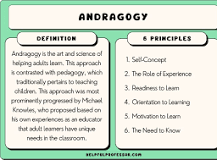Unveiling the Principles of Andragogy in Adult Education

Understanding Andragogy: The Adult Learning Theory
Andragogy, a term coined by Malcolm Knowles in the 1960s, refers to the theory and practice of adult education. Unlike pedagogy, which focuses on the teaching of children, andragogy is specifically tailored to the unique characteristics and needs of adult learners.
Key Principles of Andragogy:
- Self-directed learning: Adults are motivated to learn when they have control over their learning process and can choose what, how, and when they learn.
- Experience-based learning: Adults bring a wealth of experience to the learning environment, which should be acknowledged and integrated into the learning process.
- Relevance to life: Adult learners are more engaged when they see the practical applications of what they are learning in their personal or professional lives.
- Problem-solving approach: Adults prefer a problem-solving approach to learning, focusing on real-life issues and challenges that they encounter.
- Motivation: Adult learners are driven by intrinsic motivation, such as personal development or career advancement, rather than external rewards or punishments.
Applications of Andragogy:
Andragogy has been widely used in adult education settings, including workplace training programs, continuing education courses, and professional development workshops. By understanding the principles of andragogy, educators can create more effective learning experiences for adult learners.
In conclusion, andragogy plays a crucial role in shaping adult education practices by recognising the unique characteristics and needs of adult learners. By applying the principles of andragogy in educational settings, educators can empower adults to take control of their learning journey and achieve their personal and professional goals.
Understanding Andragogy: Key Questions and Insights into Adult Learning
- What is andragogy?
- Who developed the theory of andragogy?
- How does andragogy differ from pedagogy?
- What are the key principles of andragogy?
- How is andragogy applied in adult education?
What is andragogy?
Andragogy, a term coined by Malcolm Knowles in the 1960s, refers to the theory and practice of adult education. It is often asked, “What is andragogy?” Andragogy differs from pedagogy in that it focuses on the unique characteristics and needs of adult learners. Key principles of andragogy include self-directed learning, experience-based learning, relevance to life, problem-solving approach, and intrinsic motivation. By understanding the concept of andragogy, educators can tailor their teaching methods to better engage adult learners in various educational settings.
Who developed the theory of andragogy?
The theory of andragogy was developed by Malcolm Knowles in the 1960s. Knowles, a renowned adult education theorist, introduced the concept to distinguish the unique characteristics and learning needs of adult learners from those of children. His work in andragogy emphasised self-directed learning, experience-based learning, and the importance of relevance to adults’ lives. Knowles’ contributions have had a significant impact on the field of adult education, shaping how educators approach teaching and supporting adult learners in various educational settings.
How does andragogy differ from pedagogy?
One frequently asked question in the field of education is how andragogy differs from pedagogy. While pedagogy focuses on the teaching of children and is teacher-directed, andragogy is specifically tailored to adult learners and is more learner-centred. In pedagogy, the teacher assumes the role of an expert who imparts knowledge to students, whereas in andragogy, adults are seen as self-directed learners who bring their own life experiences and motivations to the learning process. Andragogy emphasises the importance of autonomy, experience-based learning, relevance to adult learners’ lives, problem-solving approaches, and intrinsic motivation. By understanding these differences, educators can better meet the unique needs of adult learners and create effective learning environments for them.
What are the key principles of andragogy?
The key principles of andragogy, a theory of adult learning developed by Malcolm Knowles, encompass self-directed learning, experience-based learning, relevance to life, a problem-solving approach, and intrinsic motivation. Adults are motivated to learn when they have autonomy over their learning process and can choose what, how, and when they learn. Acknowledging the wealth of experience that adults bring to the learning environment is crucial in facilitating effective learning experiences. Furthermore, adult learners are more engaged when they see the practical applications of their learning in their personal or professional lives. By focusing on real-life issues and challenges through a problem-solving approach, adult learners can apply their knowledge in meaningful ways. Intrinsic motivation, such as personal development or career advancement, serves as a driving force for adult learners in pursuing educational goals within the framework of andragogy.
How is andragogy applied in adult education?
In adult education, the application of andragogy is central to creating effective learning experiences for adult learners. Andragogy is applied by recognising that adults have unique characteristics and needs that differ from those of children. Adult education programmes designed with andragogical principles in mind focus on self-directed learning, incorporating learners’ prior experiences, making the content relevant to their lives, encouraging problem-solving, and tapping into their intrinsic motivation. By applying andragogy in adult education, educators can create engaging and meaningful learning environments that empower adults to take ownership of their learning journey and achieve their educational goals effectively.
